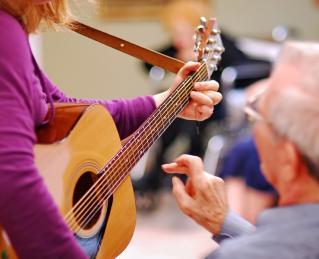You’ve probably had a moment (or more) where you put on your favorite song and either relax, get pumped up, or allow yourself to react to it in some way. Recorded music is truly a wonderful thing that helps add to our everyday lives. But have you ever thought about how different live music is from recorded music? If not, let it be known that live music has been proven to be more effective than recorded music. Research also shows it’s a strong reinforcer for required actions. Let’s put this into context…a music therapy session.
Live music is more effective in music therapy sessions. There are several reasons for this, the first one being that the music therapist can play client-preferred music. Although you can also play client preferred music on an iPhone, there’s a chance to build rapport if it comes straight from the music therapist. Next, music therapist can match the energy level of the client and adjust tempo to go faster or slower. After that, the therapist has the ability to follow the client, watching and waiting for them in order to implement positive or negative reinforcement (the presence or absence of a stimulus being music). Lastly, the therapist has the ability to adjust any musical element on the spot, including lyrics which can include the client’s name, something they need to address, etc.
Overall, the job of a music therapist is more than just a being a human jukebox. They are constantly observing, acting and reacting to enhance the therapy session at hand. To be able to meet important goals through the use of music is more enjoyable for many ages, genders and diagnosis. This process works well especially in situations where the clients are extremely fond of music. It seems that there’s more than meets the eyes…and ears.

